Journal entries
Le Bon Journal
About
Search
Contact
Readers write
Show your support
Anne Ku writes about her travels, conversations, thoughts, events, music, and anything else that is interesting enough to fill a web page. She has written and produced two chamber operas, premiered in Utrecht, Netherlands. See her publication list for more.
Support the Bon Journal by keeping analyticalQ.com alive and free. Find out about Sponsorship or how else you can show your support
Bon Journal
Music and Poetry at Dutch Music Days in Amsterdam: Nederlandse Muziekdagen
The title of this year's Dutch Music Days brought me to Amsterdam. "Muziek & Poëzie" which I translate to "Music and Poetry" encompassed not only Dutch songs, in the tradition of lieder and piano accompaniment, but also premieres of new works with full orchestra. Both days on 10th and 11th October 2009 were held in the Muziekgebouw aan't Ij near the central Amsterdam train station.
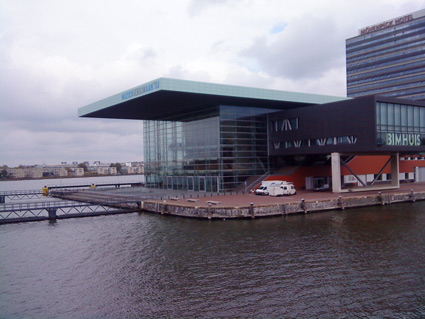
Having festered in my mind for a week, my experience of the first day of the event can now be summarised below. Why did I leave it for a week before writing this review? I was so exhausted after the first day, that I decided to call and cancel my tickets for the second day. There was no time to give attention to this "experience" until now.
After the first day, I spoke to a few art music aficionados about new music. My companion, an Amsterdam-based female composer, had concurred with me our favourite pieces in the evening concert directed by Micha Hamel. She also agreed that listening to new music was exhausting.
Because you don't know what to expect, you're on full alert. You may be surprised, challenged, or even shocked. But most of the time, you're trying to make sense of what you hear. What I noticed about new music is that it rarely sticks such that you can hum or whistle the tune afterwards. Instead, you may remember how it excited or bored you, how it pushed or pulled you, and how it confused or annoyed you.
She remarked as we sat down that she felt the presence of many composers in the Grote Zaal (big hall). I recognised the conductor Misha Hamel as the young man who had addressed the audience that same afternoon in the Liedmarathon. So that was Misha Hamel whose fingerprint was everywhere in the Dutch Music Days!
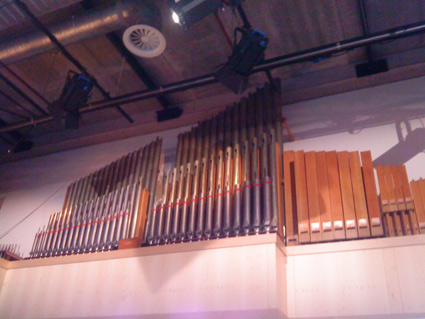
The free afternoon concert of Dutch songs "Liedmarathon" in the Bam Zaal ended one hour earlier than printed in my schedule. Without lyrics, not to mention, English translation of Dutch poems set to music, I had to guess the meaning purely from the music and the singer's expression. In nearly all classic song recitals I've attended, lyrics are printed on programme notes. All I received, as a member of the audience, was a sheet of paper, so-called programme notes, containing the names of performers, composers, and titles of the songs. I asked my afternoon companion for help. She said that some poems were very famous. "Everyone in Holland knows them."
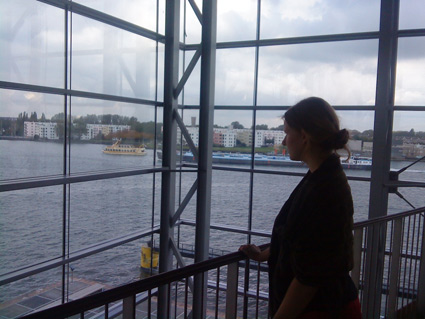
The evening concert opened with a bang. How can music be so exciting and continue to excite for the entire length of 6 minutes? Cornelis de Bondt's "Quene Note, Simple" (2006, premiere) shook us but also raised our expectations. I, for one, expected the rest of the programme to be equally exciting if not interesting.
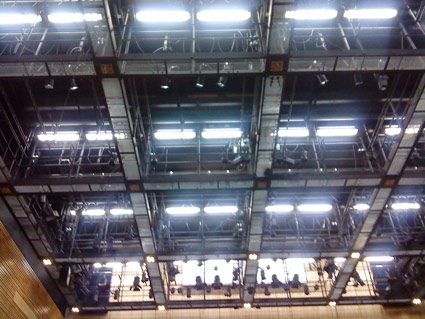
In Florian Maier and Saskia de Jong's "Operator" a voice like a whisper recorded in a horror movie speaks in Dutch. You look around to identify which musician is making these noises. A violinist walks across the stage and in front of the audience striking her violin with great passion. There is much to see and hear. Finally the conductor walks off stage before the end of the piece. It's performance art.
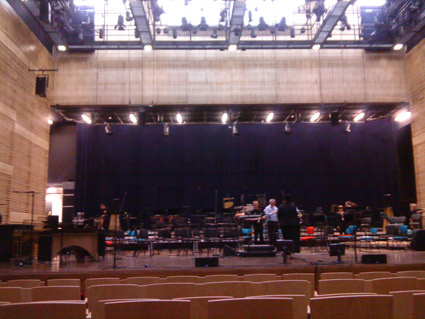
After the third piece, I started to wonder about modern music and its ability to attract new audiences. The hall was 60 to 70% full ----with empty seats dotted here and there. How many of the listeners were related to the composers whose works were being premiered? How many of them were guests of the performers? How many of them, like me, came to see the Dutch Music Days out of curiosity, having missed the previous one in 2008 and not quite sure if there were earlier ones also called the same.
And how sad I am now, nearly a week later, to discover that I had attended the last edition of "Nederlandse Muziekdagen."
Before the evening concert began in the Grote Zaal, Muziekgebouw aan't Ij
16 October 2009
Related links:
Nederlandse Muziekdagen
official website
Last time for Dutch Music Days, Het Parool newspaper (in Dutch)
Muziekgebouw aan't Ij
official website
Personal reviews
The glass building of Muziekgebouw aan't Ij, which translates to "music building on the Ij" and opened in 2005, is a 21st-century architecture for 21st-century music.
From "Amsterdam Centraal" station, the 10-minute uphill walk east and over a bridge into the main reception seems short until you get inside. If you're not going to the Bimhuis, then you'd walk down the main stairs to the bottom to check-in your coat and get your ticket.
Unfortunately, if the hall you're looking for is the Bam Zaal, you'd then have to walk up another set of stairs (or take the lift that has a 45-person capacity) to the top. The Grote Zaal, on the other hand, sits on the same floor as the restaurant, cloak room, and ticket desk.
What I like most about the building is the bright natural light transmitted by the huge glass surfaces separating the building and the blue waters of the Ij.
